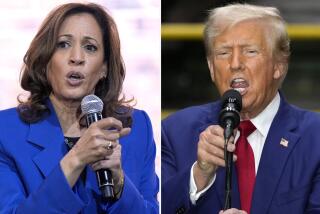Google, Verizon propose net neutrality rules
Google Inc. and Verizon Communications Inc. reached an agreement Monday on how the Internet should be regulated, but it was very different from the controversial pact that was expected.
Last week, the broadband provider and the Internet search giant were rumored to be close to a deal under which Verizon would deliver Google content more quickly — for a price. Such a deal would fly in the face of efforts to establish net neutrality, under which Internet service providers would be required to give equal treatment to all legal Web traffic.
Instead of the rumored pact, the companies proposed a seven-part policy that would give customers equal access to all legal content on the public Internet and give regulatory authority to the Federal Communications Commission.
The proposed rules, which the companies are suggesting should become legislation, would prohibit carriers from discriminating against content providers and from accepting payment from content providers to speed up delivery of specific material. Violators would be fined as much as $2 million.
This development was contrary to the reports that Google and Verizon were working on a deal that would give Google priority on the network. On Monday, both companies strongly criticized those reports.
But other elements of the proposal came under fire, including a provision that exempts services provided over private Internet channels separate from public networks. Verizon already operates its FiOS TV service on a dedicated network. In the future, the companies said, healthcare monitoring, smart grid applications and education and entertainment services could operate on such private channels.
Joel Kelsey, political advisor with nonprofit media-reform group Free Press, said the proposal would create “tollbooths on the information superhighway.”
“It’s a signed, sealed and delivered policy framework with giant loopholes that blesses the carving up of the Internet for a few deep-pocketed Internet companies and carriers,” he said in a statement.
And under the Google-Verizon proposal, the rules would not apply to the mobile wireless market.
The list of suggestions “falls far short of protecting the needs of American Internet users,” said Andrew Jay Schwartzman, policy director of nonprofit law firm Media Access Project.
In the past, Internet providers have resisted regulation, worried it would raise costs and limit network upgrades and infrastructure investments to deal with increasing traffic. Content providers have pushed for government standards to keep the Internet open.
“Our basic goal was to set aside this very divisive debate and realize we’re very dependent on each other,” Google Chief Executive Eric Schmidt told reporters.
Just days earlier, the FCC backed off trying to broker a compromise among several phone, cable TV and Internet companies, including Google and Verizon, on net neutrality rules.
“Google and Verizon have done what the FCC has so far failed to do,” said Jan Dawson, chief telecom analyst for research firm Ovum.
tiffany.hsu@latimes.com







